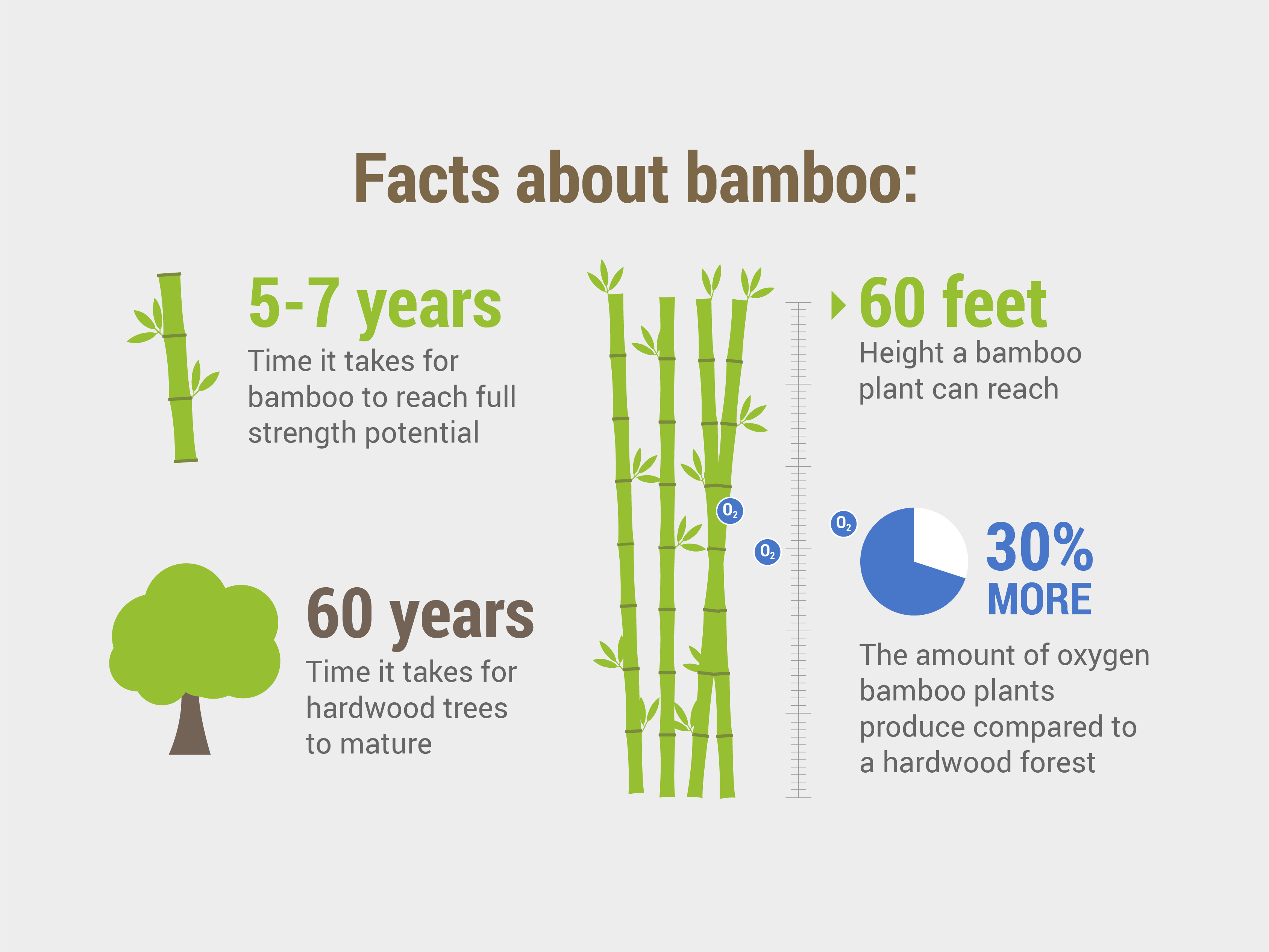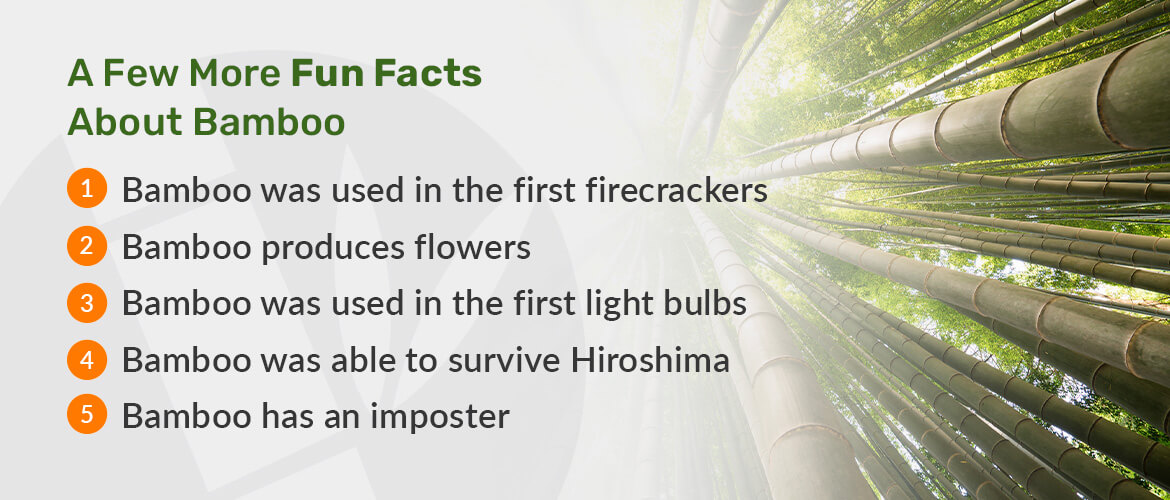Bamboo is a fast-growing, versatile plant belonging to the grass family. It plays a crucial role in the environment and economy.
Bamboo thrives across various climates, from cold mountains to hot tropical regions. This resilience makes it a vital resource worldwide. Not only does it grow at an astonishing rate, with some species capable of growing up to 91 cm (35 inches) within a 24-hour period, but it also absorbs carbon dioxide and releases 35% more oxygen into the atmosphere than an equivalent mass of trees.
This characteristic positions bamboo as an essential player in efforts to combat climate change. Economically, bamboo supports various industries, including construction, textiles, and paper, offering sustainable alternatives to more resource-intensive materials. Its rapid growth cycle and versatility in use underline its potential as a key sustainable resource for future generations. Engaging with bamboo products not only supports eco-friendly practices but also promotes a greener economy.

Credit: dribbble.com
History
Delving into the Bamboo History uncovers a rich tapestry of facts and narratives that span millennia. This remarkable plant has woven its way through the ages, marking its presence in various cultures and civilizations.
Ancient Origins Of Bamboo
Bamboo has an ancient lineage that traces back to the dawn of civilizations. Fossil records suggest that bamboo was present on the Earth over 30 million years ago. Different species of bamboo spread across the world, adapting to diverse climates and terrains. Its resilience and versatility quickly made it a staple in early human life.
Bamboo In Chinese Culture
China, known as the ‘Motherland of Bamboo’, has a history with this plant that is both profound and symbolic. The Chinese used bamboo in countless ways: from food to construction, and even in warfare. Bamboo’s significance in art, literature, and philosophy is well-documented, often symbolizing strength, flexibility, and longevity.
Bamboo’s Role In Asian Development
Across Asia, bamboo has been a cornerstone in the development of many societies. Its fast growth and strength allowed for quick and sustainable building of homes and tools. Communities thrived by harnessing the many uses of bamboo, from crafting musical instruments to creating intricate textiles.
Spread Of Bamboo Across The Globe
Trade and exploration led to the spread of bamboo across the globe. It reached new continents and cultures, each adapting its use to local needs. Bamboo has inspired innovation and creativity everywhere it has grown, proving its importance in global history.
Bamboo In Modern Times
In recent years, bamboo has seen a resurgence as a symbol of sustainability. It represents an eco-friendly alternative to traditional materials like wood and plastic. Its rapid growth and minimal environmental impact make bamboo a key player in modern green initiatives.
Ecological Benefits
The remarkable bamboo plant not only stands tall in the world of flora but also plays a crucial role in supporting our planet’s ecological balance. With its rapid growth and versatile nature, bamboo offers a host of ecological benefits that make it a champion of green living. Let’s explore how this resilient plant contributes to the health of ecosystems around the globe.
Carbon Sequestration Powerhouse
Bamboo forests excel in absorbing carbon dioxide, a major greenhouse gas. Their swift growth allows them to sequester carbon at impressive rates. This process helps mitigate climate change by reducing the amount of CO2 in the atmosphere.
Soil Protection And Erosion Control
The root systems of bamboo plants are known for their soil-binding capabilities. They prevent soil erosion and maintain the fertility of the land. This is vital for sustaining local agriculture and preserving natural landscapes.
Biodiversity Haven
Bamboo groves provide shelter and food for a wide range of species. This includes insects, birds, and mammals. By fostering diverse habitats, bamboo plays a key role in maintaining ecological diversity.
Sustainable Resource
As a rapidly renewable resource, bamboo is a sustainable alternative to traditional timber. It matures in just 3 to 5 years and doesn’t require replanting after harvest. This makes it an eco-friendly choice for various industries.
Water Conservation Ally
Bamboo’s irrigation needs are comparatively low. It thrives on natural rainfall, reducing the need for large-scale irrigation systems. This conserves precious water resources and supports water sustainability.
Air Purification Agent
Bamboo doesn’t just absorb carbon dioxide; it also releases a large amount of oxygen into the atmosphere. This enriches the air quality and contributes to a healthier environment for all living beings.
Cultural Significance
The towering green stalks of bamboo are more than just a plant; they embody a rich tapestry of history and culture. Bamboo has held a place of deep reverence and practicality in various societies around the world. The cultural significance of bamboo is deeply interwoven with traditions, symbolizing virtues such as resilience, flexibility, and longevity. Let’s delve into the cultural facets of this extraordinary plant.
Bamboo In Asian Traditions
In many Asian cultures, bamboo is a symbol of integrity and elegance. For centuries, artists have depicted bamboo in paintings and literature, often highlighting its ability to bend without breaking. This trait is likened to a person of strong character who can withstand life’s adversities. In China, bamboo is one of the ‘Four Gentlemen’ in art, alongside the plum, orchid, and chrysanthemum, representing the four seasons and various virtues.
Bamboo’s Role In Festivals And Celebrations
Bamboo plays a pivotal role in numerous festivals and celebrations across different cultures. For example, during the Tanabata Festival in Japan, people write their wishes on colorful strips of paper and tie them to bamboo branches, hoping their wishes will come true. The bamboo, then, becomes a bridge between the earthly and the divine.
Sustainable Practices With Bamboo
Bamboo’s rapid growth and versatility make it a symbol of sustainability. Many communities practice eco-friendly traditions using bamboo for building, handicrafts, and even as a food source. Its role in sustainable living is celebrated, as it provides an alternative to depleting hardwood forests. The use of bamboo supports the livelihoods of many and encourages environmental stewardship.
Bamboo In Mythology And Folklore
Bamboo also features prominently in mythology and folklore. Stories abound of gods and heroes who emerged from bamboo or used it as an essential tool. These tales often highlight the plant’s magical qualities and its association with good fortune and protection. Legends from the Philippines tell of the first man and woman emerging from a split bamboo stalk, symbolizing life and creation.
Architectural Uses And Symbolism
The use of bamboo in architecture goes beyond practicality; it carries symbolic meaning. In many regions, bamboo houses are considered to bring good health and luck to its inhabitants. The plant’s durability and flexibility make it an ideal building material in areas prone to earthquakes. Its use in construction is a testament to the harmony between human ingenuity and nature’s gifts.
Industrial Uses
Bamboo is not just a plant; it’s a powerhouse of versatility with astonishing industrial uses. Known for its rapid growth and renewable nature, bamboo has become a go-to material for sustainable production. It’s transforming industries with its strength, flexibility, and eco-friendliness. Let’s delve into the remarkable world of bamboo’s industrial applications.
Building And Construction
In the realm of building and construction, bamboo stands tall. Its impressive tensile strength rivals steel, making it an ideal choice for structural work. Builders use it for scaffolding, flooring, and even as a primary material in eco-friendly houses. The construction industry values bamboo for its durability and sustainability.
Textile Production
The textile industry harnesses bamboo’s soft fibers to produce a wide array of fabrics. These are not only comfortable but also antibacterial and odor-resistant. Clothes, towels, and even bed linens benefit from bamboo’s unique properties, offering consumers eco-conscious options.
Paper And Packaging
As a sustainable alternative to traditional wood pulp, bamboo is making waves in paper and packaging. It reduces deforestation and provides biodegradable solutions. Companies are turning to bamboo to create everything from office paper to environmentally-friendly packaging.
Furniture And Handicrafts
The natural aesthetic of bamboo lends itself beautifully to furniture and handicrafts. Its easy workability allows artisans to craft stunning, durable pieces. From chairs to decorative items, bamboo furniture is a favorite for those seeking style and sustainability.
Energy Production
Bamboo’s role extends to energy production. It serves as a biofuel source, offering a cleaner alternative to fossil fuels. Charcoal made from bamboo provides renewable energy for cooking and heating in many communities around the world.

Credit: blog.foreverbamboo.com
Frequently Asked Questions
Bamboo is one of the fastest-growing plants, shooting up as much as 35 inches per day. It releases 35% more oxygen than equivalent trees. Versatile in use, bamboo is a key resource for building, clothing, and food. Some bamboo species can live over 100 years.
Remarkably, bamboo can regenerate from its own roots without needing replanting.
Bamboo is remarkable for its rapid growth, sustainable nature, and strength-to-weight ratio. It’s also versatile, serving multiple uses from construction to textiles.
Bamboo plants typically live for 20 to 80 years. Certain species may survive longer, depending on environmental conditions and species type.
Bamboo can grow up to 91 cm (36 inches) within a 24-hour period. This rapid growth varies by species.
Conclusion
Bamboo is more than just a plant; it’s a versatile marvel. From sustainable resources to cultural significance, it enriches our lives. Embrace bamboo’s potential and let its resilience inspire us. Remember, each fact about bamboo is a step towards greener living.
Let’s grow with bamboo, for a better tomorrow.



